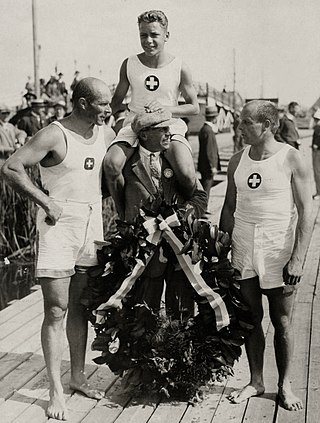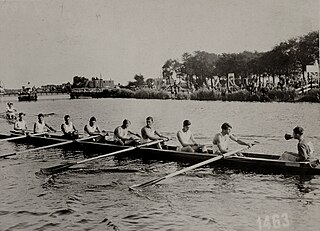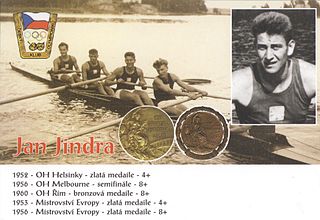
The men's coxed pair event was a rowing event conducted as part of the 1964 Summer Olympics programme. It was held from 11 to 15 October. There were 16 boats from 16 nations, with each nation limited to a single boat in the event. The event was won by American crew Edward Ferry, Conn Findlay, and coxswain Kent Mitchell. Findlay had been on the United States gold medal crew in 1956 and bronze medal crew in 1960; he was the first man to earn two gold medals in the event, as well as the first man to win three medals of any color in the event. Mitchell had also been on the 1960 crew, and was the seventh man to earn multiple medals in the coxed pair. Jacques Morel, Georges Morel, and cox Jean-Claude Darouy took silver to earn France's first medal in the event since 1952. Herman Rouwé, Erik Hartsuiker, Jan Just Bos earned what was formally the Netherlands' first medal in the event; a pair of Dutch rowers had won the first edition in 1900, but had jettisoned their cox in favor of a local French boy between rounds and thus that medal was a "mixed team" medal.

The men's coxed four event was a rowing event conducted as part of the Rowing at the 1964 Summer Olympics programme. It was held from 11 to 15 October. There were 16 boats from 16 nations, with each nation limited to a single boat in the event. The event was won by the United Team of Germany, the nation's second consecutive victory in the men's coxed four. The two medals placed the United Team of Germany in a tie for second-most all-time with Switzerland and Italy; Germany had the most with four. Italy earned its third straight medal in the event, all of different colours, with a silver in Tokyo. The bronze medal went to the Netherlands, the nation's first medal in the event since 1900.

The men's eight event was a rowing event conducted as part of the 1964 Summer Olympics programme. It was held from 12 to 15 October at the Toda Rowing Course. There were 14 boats from 14 nations, with each nation limited to a single boat in the event. The event was won by the United States, returning the top of the podium after losing their eight-Games winning streak with a fifth-place finish in 1960; it was the nation's 11th overall victory in the men's eight. The defending champions, the United Team of Germany, took silver; the Germans defeated the United States in the opening round but lost the rematch in the final after the Americans advanced through the repechage. Czechoslovakia repeated as bronze medalists.

The men's coxed four event was part of the rowing programme at the 1924 Summer Olympics. The competition, the fourth appearance of the event, was held from 13 to 17 July 1924 on the river Seine. There were 10 boats from 10 nations, with each nation limited to a single boat in the event. The event was won by Switzerland, the nation's second consecutive victory in the event; the two Swiss victories matched Germany for most among nations to that point. France earned its first medal in the event since 1900 with silver. The United States reached the podium for the second straight Games with a bronze medal. Hans Walter, a member of the Swiss crew in 1920 as well as this year, was the first man to win two medals in the event, and the only one to win two golds.

The men's single sculls event was part of the rowing programme at the 1928 Summer Olympics. It was one of seven rowing events for men and was the seventh appearance of the event, which had been on the programme for every Games since rowing was added in 1900. There were 15 competitors, each from a different nation. The event was won by Bobby Pearce of Australia, the nation's first medal in the event. Silver went to Ken Myers of the United States, extending that nation's podium streak to three Games. David Collet of Great Britain took bronze; that nation had also earned a medal each time it appeared and had a five-Games podium streak.

The men's coxed pair event was part of the rowing programme at the 1928 Summer Olympics. It was one of seven rowing events for men and was the fourth appearance of the event. It was held from 3 to 10 August near Sloten, Amsterdam. There were 6 boats from 6 nations, with each nation limited to one boat in the event. The event was won by the Swiss team, the nation's second consecutive victory in the event. Brothers Hans Schöchlin and Karl Schöchlin rowed, with Hans Bourquin the coxswain. Another pair of brothers took silver: France's Armand Marcelle and Édouard Marcelle. The Belgian bronze medal team consisted of Léon Flament, François de Coninck, and Georges Anthony; it was the nation's first medal in the event.

The men's coxed four event was part of the rowing programme at the 1928 Summer Olympics. It was one of seven rowing events for men and was the fifth appearance of the event. It was held from 3 to 10 August. There were 11 boats from 11 nations, with each nation limited to a single boat in the event. The event was won by Italy, the nation's first medal in the men's coxed four. The Italian team dethroned two-time reigning champion Switzerland, beating the Swiss crew in both the semifinals and the final. Switzerland's silver medal brought its podium streak in the event to three Games; the United States had its two-Games medal streak end. Poland took bronze, its first medal in the event.

The men's eight event was part of the rowing programme at the 1928 Summer Olympics. It was one of seven rowing events for men and was the seventh appearance of the event, which had been on the programme for every Olympic Games since rowing was added in 1900. It was held from 2 to 10 August 1928. There were 11 boats from 11 nations, with each nation limited to a single boat in the event. The event was won by the United States, the third consecutive victory for the Americans in the event and fifth overall. Great Britain returned to the podium after a one-Games absence in 1924 broke a three-Games medal streak, taking silver this time. Defending silver medalists Canada took bronze.

The men's coxed pair competition at the 1972 Summer Olympics in Munich took place from 27 August to 2 September at the Olympic Regatta Course in Oberschleißheim. There were 21 boats from 21 nations, with each nation limited to a single boat in the event. The event was won by East German crew Wolfgang Gunkel, Jörg Lucke, and coxswain Klaus-Dieter Neubert; it was the first medal in the event for East Germany as a separate nation. Czechoslovakia (silver) and Romania (bronze) also won their first medals in the men's coxed pair.
The men's eight competition at the 1932 Summer Olympics in Los Angeles took place at the Long Beach Marine Stadium. It was held from 10 to 13 August. There were 8 boats from 8 nations, with each nation limited to a single boat in the event. The event was won by the United States, the nation's fourth consecutive and sixth overall victory; the Americans had won every time they competed. Silver went to Italy, that nation's second medal in the men's eight after a bronze in 1924. Canada repeated as bronze medalists, stretching their podium streak in the event to three Games.

The men's coxed pair rowing competition at the 1980 Summer Olympics took place at Krylatskoye Sports Complex Canoeing and Rowing Basin, Moscow, Russian SFSR, Soviet Union. The event was held from 20 to 27 July. There were 11 boats from 11 nations, with each nation limited to a single boat in the event. The event was won by Harald Jährling, Friedrich-Wilhelm Ulrich, and coxswain Georg Spohr of East Germany, the first men to successfully repeat as Olympic champions in the event. It was also the first time that a crew of the same three men earned multiple medals of any colour. East Germany's three straight medals matched the United States for most among nations to that point. Silver went to the Soviet Union again, though with an entirely different team from its 1976 runner-up crew; the silver medalists this time were Viktor Pereverzev, Gennadi Kryuçkin, and cox Aleksandr Lukyanov. Duško Mrduljaš, Zlatko Celent, and cox Josip Reić earned Yugoslavia's first medal in the event with their bronze.

The men's eight competition at the 1936 Summer Olympics took place at Grünau Regatta Course in Berlin, Germany. The event was held from 12 to 14 August, and was won by a United States crew from the University of Washington. There were 14 boats from 14 nations, with each nation limited to a single boat in the event. The victory was the fifth consecutive gold medal in the event for the United States and seventh overall; the Americans had won every time they competed. Italy repeated as silver medalists. Germany earned its first medal in the men's eight since 1912 with its bronze. Canada's three-Games podium streak ended.

The men's eight competition at the 1948 Summer Olympics took place at Henley-on-Thames, near London. It was held from 5 to 9 August. There were 12 boats from 12 nations, with each nation limited to a single boat in the event. The event was won by the United States, the nation's sixth consecutive and eighth overall gold medal in the men's eight; the Americans had won every time they competed. Great Britain, the only other nation to have won in the event, finished second for its first medal in the event since 1928. Norway took bronze, its first medal in the men's eight since 1920.

The men's coxed four competition at the 1952 Summer Olympics took place at Mei Bay, Helsinki, Finland. It was held from 20 to 23 August and was won by the team from Czechoslovakia. There were 17 boats from 17 nations, with each nation limited to a single boat in the event. The gold medal was Czechoslovakia's first medal in the men's coxed four. Switzerland earned its third consecutive silver medal, and sixth medal in seven Games dating back to 1920. The reigning champion United States took bronze.

The men's eight competition at the 1952 Summer Olympics took place at Meilahti, Finland. It was held from 20 to 23 July. There were 14 boats from 14 nations, with each nation limited to a single boat in the event. The event was won by the United States, the nation's seventh consecutive and ninth overall gold medal in the men's eight; the Americans had won every time they competed. The Soviet Union took silver in its Olympics debut; Australia's bronze was its first medal in the men's eight.

The men's coxed pair competition at the 1956 Summer Olympics took place at Lake Wendouree near Ballarat, Australia, from 23 to 27 November. There were 8 boats from 8 nations, with each nation limited to one boat in the event. The event was won by the American crew, rowers Arthur Ayrault and Conn Findlay and coxswain Kurt Seiffert. It was the first victory in the event for the United States since 1932 and second overall, matching Switzerland for most among nations at that point. The United Team of Germany took silver in its debut. The Soviet Union earned its first medal in the event, with Ihor Yemchuk, Heorhiy Zhylin, and Vladimir Petrov (cox) taking bronze.

The men's eight competition at the 1956 Summer Olympics took place at Lake Wendouree near Ballarat, Australia. It was held from 23 to 27 November. There were 10 boats from 10 nations, with each nation limited to a single boat in the event. The event was won by the United States, the nation's eighth consecutive and 10th overall gold medal in the men's eight; the Americans had won every time they competed. Canada took silver, its first medal in the men's eight since 1932. Australia repeated as bronze medalists.

The men's coxed pair competition at the 1976 Summer Olympics took place at Notre Dame Island Olympic Basin, Canada. It was held from 18 to 25 July. There were 13 boats from 13 nations, with each nation limited to a single boat in the event. The event was won by Harald Jährling, Friedrich-Wilhelm Ulrich, and Georg Spohr of East Germany, the nation's second consecutive victory in the event. The Soviet Union earned that nation's first medal in the event since 1960 with their silver. The Czechoslovakian brothers Oldřich Svojanovský and Pavel Svojanovský became the 8th and 9th men to win multiple medals in the event, adding a bronze to 1972 silver with new cox Ludvík Vébr.

The men's coxed pair competition at the 1992 Summer Olympics took place at Lake of Banyoles, Spain. It was held from 28 July to 2 August. There were 16 boats from 16 nations, with each nation limited to one boat in the event. The event was won by brothers Greg and Jonny Searle and coxswain Garry Herbert of Great Britain, the nation's first victory in the event. It was the third consecutive Games with brothers winning as the rowers; Italy's Carmine Abbagnale and Giuseppe Abbagnale had won in 1984 and 1988. They, along with longtime cox Giuseppe Di Capua, took silver this year, becoming the only crew to win three medals together in the event. Bronze went to Romanians Dimitrie Popescu, Nicolae Țaga, and cox Dumitru Răducanu. Popescu and Răducanu had been on the 1984 silver medal team, making them the 16th and 17th—and final—men to earn multiple medals in the event.
The men's eight competition at the 1992 Summer Olympics took place at Lake of Banyoles, Spain. It was held from 28 July to 2 August. There were 14 boats from 14 nations, with each nation limited to a single boat in the event. The event was won by Canada, the nation's second victory to match Great Britain, East Germany, and West Germany for second-most among nations. Romania earned its first medal in the men's eight with silver. A reunited Germany took bronze; West Germany had been the defending champion.













